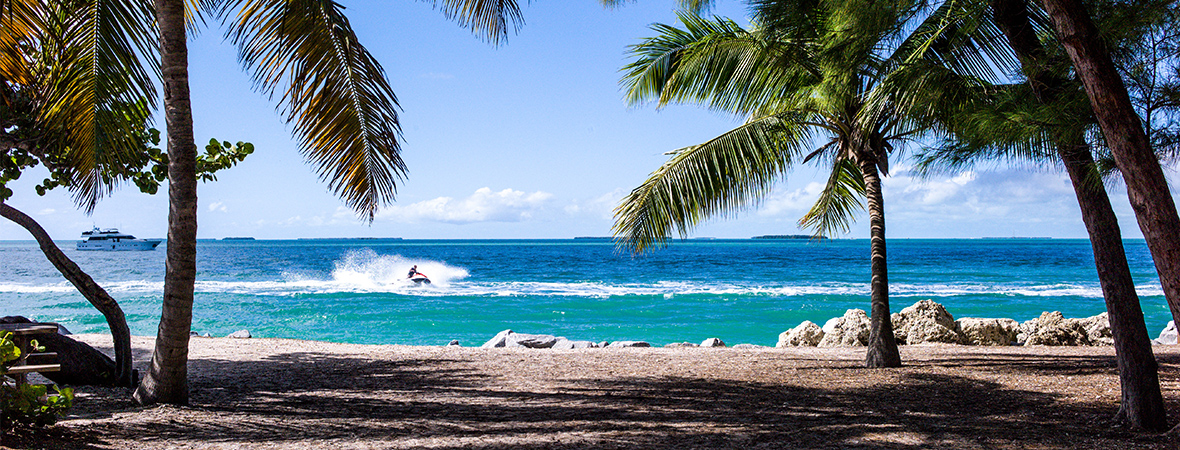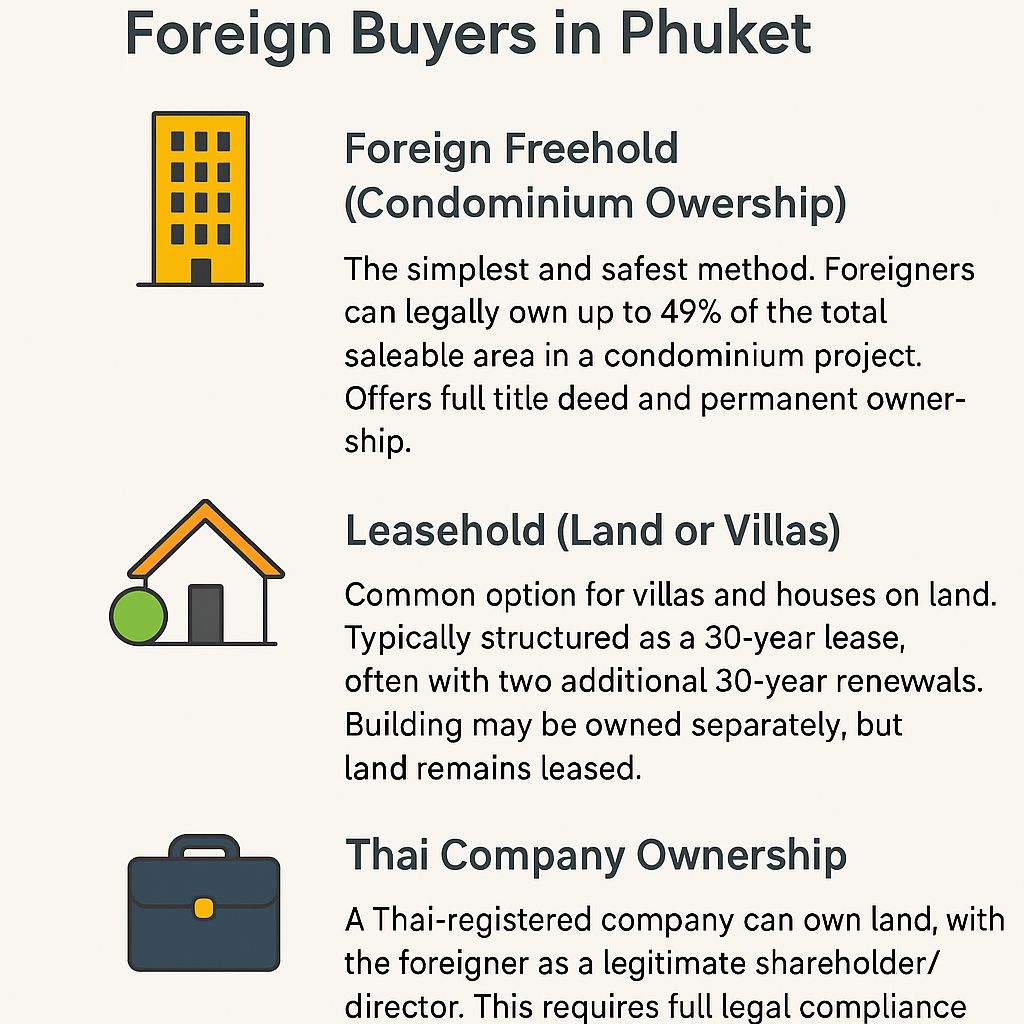Buying Phuket property as a foreigner is possible, but it comes with restrictions, rules, and specific ownership structures that must be carefully understood. Phuket has long attracted international investors, retirees, and lifestyle buyers, and it remains one of the most desirable destinations. This guide explains the legal options, risks, and protections available so foreigners can buy safely and confidently.
What Foreigners Can and Cannot Own in Phuket
Thai law prohibits foreigners from owning land directly in their own name. However, there are legal pathways that allow foreigners to purchase property securely:
-
Foreign Freehold Condominiums – Up to 49% of units in a condo project can be owned freehold by foreigners. This is the most direct and safest ownership structure.
-
Leasehold Agreements – Land or villas can be leased for 30 years, with options for renewal written into the contract.
-
Building Ownership – Foreigners may own the villa, house, or other structure on leased land, provided registration is handled correctly at the Land Office.
-
Thai Company Ownership – Possible only if the company is fully legitimate, majority Thai-owned, revenue-generating, and tax-paying. Sham or nominee structures are illegal.
For a direct ownership route, see our guide on foreign freehold condos in Phuket, which explains how foreigners can hold title in their own name under Thai law.
Due Diligence When Buying Phuket Property as a Foreigner
Foreign buyers must carry out careful checks before committing to any purchase:
-
Title Search – Verify with the Land Office that the deed is genuine, free from encumbrances, and correctly registered.
-
Zoning and Planning – Confirm what can legally be built on the land.
-
Contracts – Ensure bilingual contracts are clear, accurate, and professionally reviewed.
-
Funds Transfer – For condominiums, foreign currency must be transferred from overseas and documented through a Foreign Exchange Transaction Form (FETF).
Title deeds and registrations are administered by the Thai Land Department, which provides the official framework for ownership and transfers.
Why Phuket Remains Attractive for Foreign Owners
Even with restrictions, buying Phuket property as a foreigner remains appealing because:
-
Established mechanisms – Freehold condos and leaseholds are widely used, with predictable Land Office procedures.
-
Infrastructure – Phuket offers international hospitals, schools, and an international airport with global connections.
-
Property choice – From seaview condos to leasehold villas and mixed developments, there are options for all needs.
-
Lifestyle – Beaches, tropical climate, diverse dining, wellness amenities, and strong rental and resale markets make Phuket unique.
Risks of Cutting Corners When Buying Property in Phuket As a Foreigner
Shortcuts such as nominee arrangements or shell companies are dangerous. They may appear to offer control, but in reality:
-
Foreigners risk losing ownership if challenged by authorities.
-
Nominee shareholders are illegal under the Land Code and Foreign Business Act.
-
Criminal liability may extend to both the foreigner and the Thai nominees.
Proposed AMLA reforms (Anti-Money Laundering Act) are set to tighten scrutiny, expand investigation powers, and increase the risk of confiscation for structures designed to conceal foreign control. Recent articles, such as in The Nation, Thailand, highlight growing concerns among foreign buyers about changing regulations and the impact on property transactions.
Safer Alternatives to Consider
Foreigners who want long-term, secure ownership should focus on legal and proven structures:
-
Foreign Freehold Condominiums – Direct title ownership within the 49% foreign quota.
-
Leasehold Agreements – 30-year renewable leases for villas and land use.
-
Usufructs or Superficies – Long-term use or building rights registered at the Land Office.
These approaches are transparent, enforceable, and avoid the risks of nominee or shell company arrangements.
Summary: Buying Phuket Property as a Foreigner
-
Foreigners cannot own land directly, but can own foreign freehold condominiums and register 30-year leaseholds.
-
Villas and houses can be owned on leased land if the structure is registered.
-
Thai company ownership is only valid if the company is a genuine, revenue-generating business.
-
Due diligence is essential – title checks, zoning, contracts, and FETF requirements.
-
Nominee arrangements are illegal, and AMLA reforms mean stricter enforcement is likely.
FAQ: Buying Phuket Property as a Foreigner
Q: What is the safest way for a foreigner to own property in Phuket?
Foreign freehold condominiums, which allow direct ownership under Thai law.
Q: Can a foreigner own a villa in Phuket?
Yes, by leasing the land and separately registering ownership of the villa or structure.
Q: How long does a leasehold last?
Typically 30 years, with options for renewal written into the contract. Only the first term is guaranteed by law.
Q: Can foreigners still use Thai companies to own land?
Only if the company is fully legitimate, majority Thai-owned, and compliant with Thai corporate law. Sham or nominee companies are illegal.
Q: Why is buying Phuket property as a foreigner still attractive despite restrictions?
The island offers established ownership routes, strong infrastructure, and lifestyle appeal that support long-term value.
Related Guides
Conclusion
Buying Phuket property as a foreigner is possible, safe, and rewarding, if done through the right legal channels. Whether you choose a foreign freehold condo or a properly registered leasehold, careful due diligence and professional legal advice are key to securing your investment.
Disclaimer: The information contained in this article is provided for general informational purposes only and does not constitute legal, financial, or investment advice. While every effort has been made to ensure accuracy at the time of publication, property laws and regulations in Thailand are subject to change. Readers should always seek independent legal advice from a qualified Thai lawyer before making any property-related decision or transaction.



Social Contact